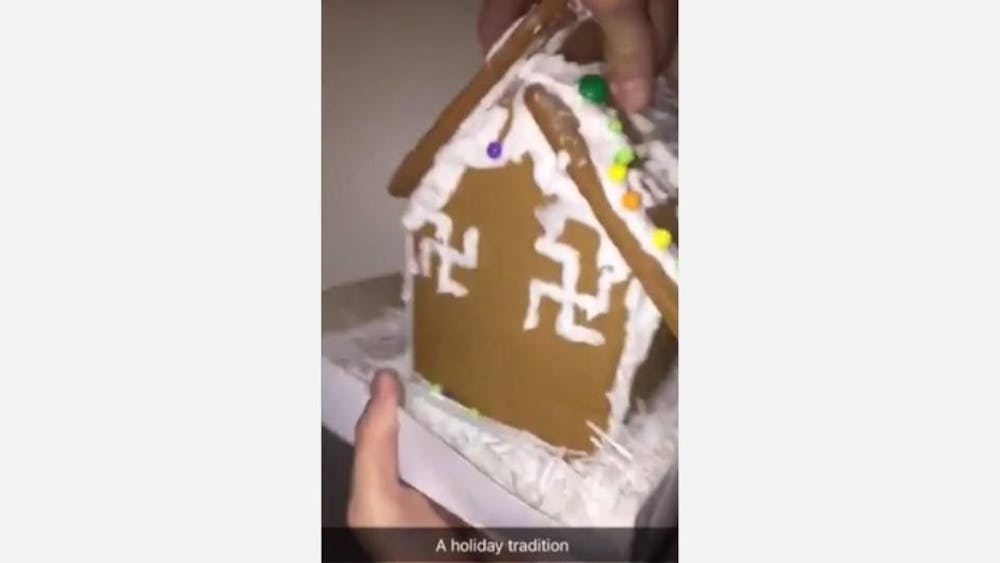Editor's note: This story was updated on Dec. 15 to include more information and detail from Grollman and McCoy.
A Snapchat video showing a gingerbread house decorated with swastikas being dropped out of a window was geotagged to the University of Richmond Monday night.
The University Police Department has investigated the incident and has concluded that nothing in the video is a crime, according to a statement by Chief David McCoy, who also serves as the associate vice president of public safety.
Two students made the house and were expressing their dislike of swastikas and what they represent, according to McCoy's statement.
The gingerbread house also included the words "JUUL" and "Hit or Miss," which the students were also expressing their dislike for, McCoy said in the statement. In the video, the students can be seen and heard showing all of the decorations on the gingerbread house, then leaning out a window on an upper floor, yelling "Merry Christmas" and dropping the gingerbread house onto the sidewalk.
The two students, who were not identified, have apologized and been referred to the college deans, according to an email about the incident from President Ronald A. Crutcher that was sent to the campus community on Thursday.
The university’s Bias Resource Team also met on Thursday afternoon in response to the video, according to Crutcher's email.
Joshua Jeffreys, Jewish chaplain and director of religious life, notified members of the University of Richmond Jewish community about the incident via email Thursday morning.
“We know that those involved in this incident intended this video as a prank, and that they have offered a contrite apology regarding their misguided antics … We now understand that this was not a joke, and rather a manifestation of the students involved expressing their dislike of the antisemitisim, bigotry, and hatred the swastika represents to so many with the intent of destroying the object,” Jeffreys said in the email.
Sociology professor Eric Grollman was the first person to bring the incident to the attention of university administration. They said they contacted the Office of Common Ground and submitted a bias incident report on Tuesday.
Grollman said they were suspicious of the idea that the students in the video were expressing dislike.
“I’m surprised that we’re even entertaining that that is a legitimate rationale, and that we’re not sort of further interrogating that,” Grollman said. “It read as people partying, not protesting.”
Enjoy what you're reading?
Signup for our newsletter
Grollman said they were suspicious of the students' motives because the first public comment from the university was that the video was a prank, the second was that the video was a joke and the university position on Thursday was that the students were expressing dislike for what was represented on the gingerbread house, they said.
“To me it really signifies what is going to come out of this, which is nothing,” Grollman said.
Grollman contacted local media about the video on Wednesday.
“For me it felt like an opportunity to show that these things keep happening, that we are not all that inclusive on campus,” Grollman said.
Jeff Lowe, president of Students Creating Opportunities, Pride and Equality, also expressed concerns about the presence of hate symbols on campus.
“We were stunned as SCOPE has been experiencing problems with Nazi symbolism,” Lowe said in a statement over email. Lowe said previous instances of Nazi symbolism were part of an ongoing bias investigation.
"This incident reminds us that we have serious work ahead, but it also reinforces our dedication to do what is needed to ensure opportunity for people of all faiths and backgrounds to thrive," Crutcher said in his email.
Grollman expressed disappointment in the focus they saw being placed into what the students who made the gingerbread house were thinking.
“There are their intentions, and then there’s the impact,” Grollman said. “I feel like we’re digging deeper into, 'Well, what did they mean by it, what were they thinking, what was their state of mind' and so forth, and no one’s asking, 'What is the impact?”'
McCoy said in an email that the focus of the investigation was placed on the mindset of the students who made the video.
According to the FBI Uniform Crime Reporting Hate Crime Data Collection Guidelines and Training Manual, a hate crime is, "A committed criminal offense that is motivated, in whole or in part, by the offender’s bias(es) against a race, religion, disability, sexual orientation, ethnicity, gender, or gender identity."
"It is the perception of the offender, not the perception of the victim that determines whether a crime is classified as a hate crime," McCoy said in an email.
Hillel oversight coordinator Ben Pomerantz said he believed that inclusivity was a big issue on campus. Grollman said they believed the university did not do enough to meet the needs of diverse students on campus.
“It’s as if once we’ve gotten them onto campus, the responsibility to make sure they actually feel included and integrated is no longer of concern,” Grollman said.
Contact senior news writer Cal Pringle at caljpringle@gmail.com.
Support independent student media
You can make a tax-deductible donation by clicking the button below, which takes you to our secure PayPal account. The page is set up to receive contributions in whatever amount you designate. We look forward to using the money we raise to further our mission of providing honest and accurate information to students, faculty, staff, alumni and others in the general public.
Donate Now



